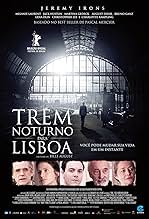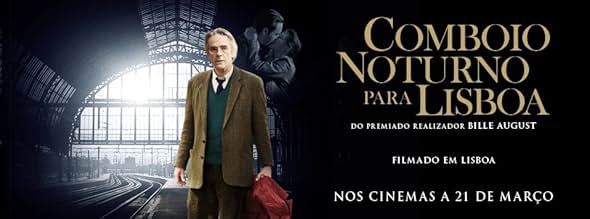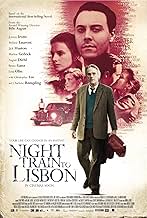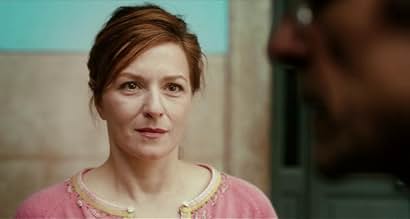Swiss Professor Raimund Gregorius abandons his lectures and buttoned-down life to embark on a thrilling adventure that will take him on a journey to the very heart of himself.Swiss Professor Raimund Gregorius abandons his lectures and buttoned-down life to embark on a thrilling adventure that will take him on a journey to the very heart of himself.Swiss Professor Raimund Gregorius abandons his lectures and buttoned-down life to embark on a thrilling adventure that will take him on a journey to the very heart of himself.
- Director
- Writers
- Stars
- Awards
- 3 wins & 3 nominations total
- Catarina Mendez
- (as Sarah Spale-Bühlmann)
- Director
- Writers
- All cast & crew
- Production, box office & more at IMDbPro
Featured reviews
A remarkable movie, with shades of magic and threads of a true national angst still resolving in contemporary Portugal. I just returned from a visit there and can sense some vestige of another era in the buildings, but not in the people. The era of dictatorship is no longer visible to the tourist.
But that is the meat of the movie, set after Salazar's long reign, and with the aftermath of memories and lost ones still mourned. But it's all told (based on a novel by a Swiss writer) as if in a dream, or in an individual's search through imprecise information and people who don't always talk about it the way you might expect. It's a series of small surprises, elegantly wrought.
So in all these ways it's a powerful movie. It's small and intimate, however, not an epic about this great turning point in Portuguese history. In a way it's appropriate, because I found the people there less exuberant and more contemplative than the Spaniards next door. There are always a million reasons for such things—climate, outside cultural influences, etc.—but it's so true that the movie is actually terribly honest. It reveals the truth, in little facets, and never complete.
The star certainly is Jeremy Irons, who plays the leading role with tenderness and quiet certitude. He's terrific, and perfect for this part. Also appearing is Charlotte Rampling who has a knack for small, odd, but critical roles in offbeat movies. The cast is wide, and in the many flashbacks the characters gradually intersect in different ways, revealing their personal connections to the political strife of the times.
Good stuff? Excellent stuff! I liked it more than I expected to. It's slow at times, and maybe (if you are not paying attention) a hair confusing, but give it a go if you are inclined at all. A serious, brooding but not depressing drama about, in the end, relationship. As all the best movies are.
The film was nominated for six Sophia Awards _ the national film awards of Portugal _ including best picture, and won three, for best supporting actress (Beatrice Bartarda), best art direction and best make-up.
Directed by Bille August ("Pelle the Conqueror"), "Night Train to Lisbon" was adapted from a philosophical novel by Swiss author Pascal Mercier.
Mercier's quotations are spoken in voice-over by the film's protagonist, Raimund Gregorius, played by Oscar winner Jeremy Irons, a quiet, lonely classical studies professor working in Bern, Switzerland, who rescues a young woman about to leap off a bridge and after she disappears, finds himself on a quest to Lisbon, not only to find her but to fully understand the story of a doctor-turned-poet whose book he discovers in the pocket of the coat she leaves behind.
The story isn't as dense or contrived as it sounds, thanks to the deft screenplay by Greg Latter and Ulrich Herrmann, and the uniform commitment to character and plot by Irons and a cast that includes veterans Tom Courtenay, Charlotte Rampling, Christpher Lee and Lena Olin.
It's the kind of story that sucks us in because it's a kind of "getaway" piece: Who doesn't daydream in a Walter Mittyish way of getting away from it all and taking off on an historical detective story, which is what this is.
Once in Portugal, Irons' Gregorius sets about on a quest for the author but instead finds his sister, Adriana (Rampling as the mature version, Batarda as the younger), and learns that Amadeu died in 1974 and that only 100 copies of his book were printed. The sister has six of the books and, wondering what happened to the rest, is delighted to find that her late brother's limited edition work found an audience beyond her country's borders. Thus, a tenuous but all-important bond is formed between the soft-spoken, insightful professor and the poet's sibling.
The movie intersperses Raimund's investigation with flashbacks to a past in which we meet the young Amadeu (a superb Jack Huston), a member of the resistance to the dictatorship of António Salazar.
Through Adriana, Raimund meets the priest (Lee) who taught Amadeu, Amadeu's best friend, Jorge (Bruno Ganz in the older version, August Diehl in the younger), and learns of Estefania (the fiery Mélanie Laurent), a resistance fighter who was Jorge's girlfriend until she met and fell instantly in love with the handsome Amadeu.
After Raimund breaks his spectacles, he meets a sympathetic optician Mariana (Martina Gedeck) who by happenstance has an uncle named Joao (Courtenay as the elder version, Marco D'Almeida as the youthful one) who was also a member of the resistance and fills in the story. Late in the film, the strings of the plot are pulled together when Raimund finally meets the mature Estefania (a stunningly beautiful and completely believable Olin).
As I said, "Night Train to Lisbon" isn't for everyone, especially for those accustomed to tons of action and instant gratification via computer wizardry and slam bang eye-for-an-eye retribution, but it did it for me. It's extraordinarily literate and sumptuously photographed to boot, and it's not a stretch to say it contains threads of David Lean's wonderful 1965 film version of "Doctor Zhivago," albeit on a much smaller scale.
I was especially drawn to Irons' professor, a sensationally muted performance that holds the whole thing together.
Since you'll probably be watching this in your living room, "Night Train to Lisbon" is rated R (under 17 requires accompanying parent or adult guardian) for a scene of violence and brief sexuality (which really aren't all that bad).
But, I will say...
The director moves you along at such a perfect pace that you almost feel like you're floating. The topics aren't casual but he hovers over them at just the right height.
The acting is right on the money, it suits the movie perfectly, no one is out of step.
The story moves seamlessly between past and present, you won't feel a bump anywhere. It's true, the movie is multi-layered, but the straight up story is more than enough.
And the ending is perfect for this type of movie.
It really is worth the watch, but as I mentioned you might need to be a little older to really...
I could not help thinking of there being a connection between Amadeu de Prado and the world famous Portuguese poet Fernando Pessoa. The shots of Lisbon are wonderful, the beautiful harbour and hilly narrow streets. I could imagine Vasco da Gama's fleet leaving the port during Portugal's period of world exploration. The acting was superb, Jeremy Irons was the perfect Prof. On the surface absent minded and intellectual, but in practice, seizing the moment with an iron courage to probe the truth no matter where it led, but with a sense of humour knowing that nothing in life is all black or white. Martina Gedeck was so believable and you like her more and more with each shot. Tom Courtney's performance as João Eça was amazing but scary when you realize what happens to ordinary people during extraordinary times.
Many themes are encountered such as friendship, betrayal, and life as a chaotic process without any divine guidance. My hope is at the end of the film our professor needed a second adjustment for his new glasses.
Did you know
- TriviaThe title of the book written by the character Amadeu "Um Ourives das Palavras" is Portuguese for "A Goldsmith of Words."
- GoofsWhen Raimund is on the Bern Train Station, he is thinking whether he goes on board or not. The train starts to move and the doors are still open, which nowadays it would be impossible in trains of that dimension for security reasons. Although the error was needed to give more tension to the scene, it is still a thing that would never occur nowadays.
- Quotes
Amadeu: We leave something of ourselves behind when we leave a place. We stay there, even though we go away. And there are things in us that we can find again only by going back there. We travel to ourselves when we go to a place. Now we have covered the stretch of our lives, no matter how brief it may have been.
- ConnectionsReferenced in The Salesman (2016)
- SoundtracksLisboa
Composer: Annette Focks
Portugese Guitar: Damiel Pircher
Sound Mixer: Tom Tautorat
Recording & Mix Studio: Emil Berlin Studios
- How long is Night Train to Lisbon?Powered by Alexa
Details
- Release date
- Countries of origin
- Official site
- Languages
- Also known as
- Tren nocturno a Lisboa
- Filming locations
- Production companies
- See more company credits at IMDbPro
Box office
- Budget
- €7,700,000 (estimated)
- Gross worldwide
- $12,020,387
- Runtime
- 1h 51m(111 min)
- Color
- Sound mix
- Aspect ratio
- 1.85 : 1









































